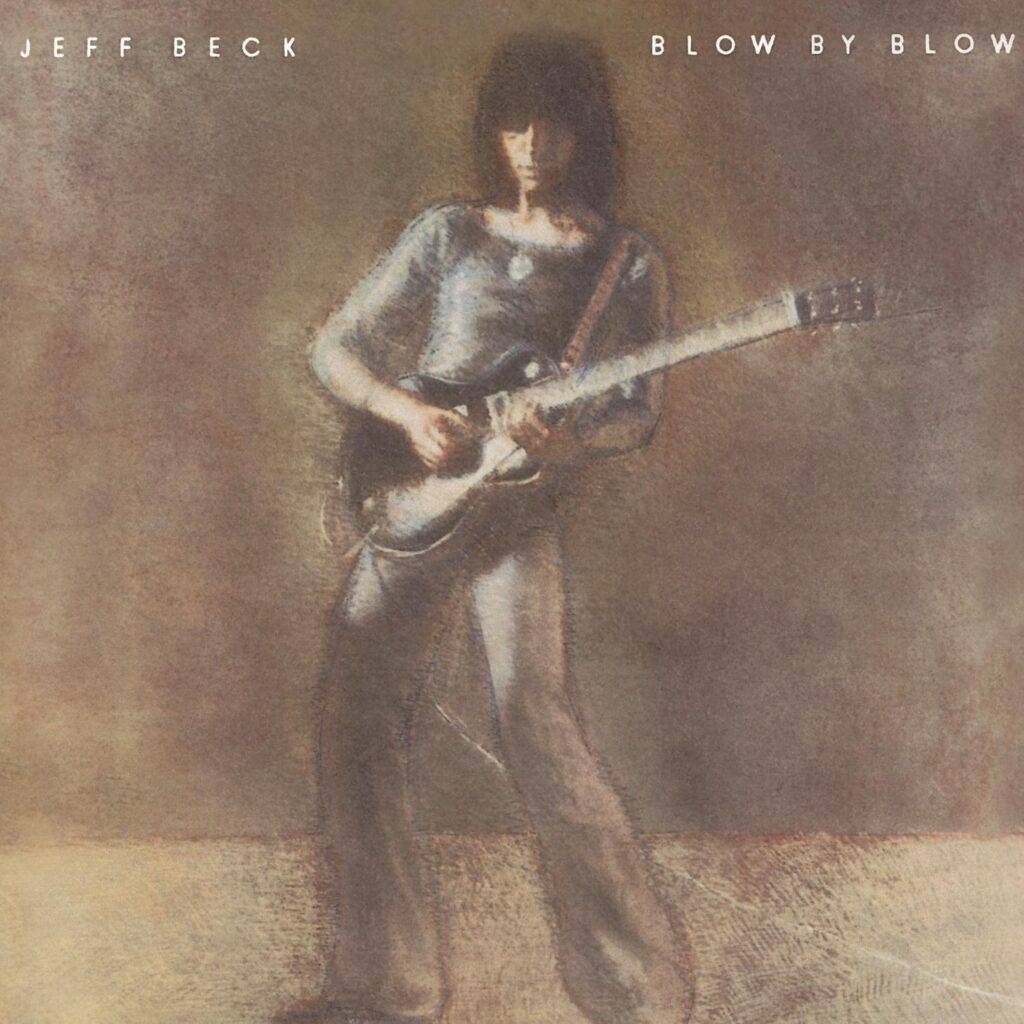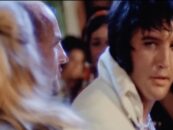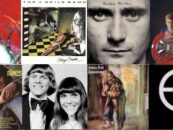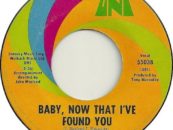 In 1974, Jeff Beck pulled the plug on the Beck, Bogert and Appice group after one studio LP and a Japan-only live album. He told journalist John Tobler that the lack of original material was one factor in the breakup, but competing managers “tugging in opposite directions,” fighting over money and billing also proved a drag (bassist Tim Bogert and drummer Carmine Appice had American representation and Beck had English). Some time futzing with Yes offshoot Badger and new band Upp yielded nothing, and Beck withdrew from public view, until he reconnected with the keyboardist Max Middleton, who’d been with the second Jeff Beck Group.
In 1974, Jeff Beck pulled the plug on the Beck, Bogert and Appice group after one studio LP and a Japan-only live album. He told journalist John Tobler that the lack of original material was one factor in the breakup, but competing managers “tugging in opposite directions,” fighting over money and billing also proved a drag (bassist Tim Bogert and drummer Carmine Appice had American representation and Beck had English). Some time futzing with Yes offshoot Badger and new band Upp yielded nothing, and Beck withdrew from public view, until he reconnected with the keyboardist Max Middleton, who’d been with the second Jeff Beck Group.
Middleton had jazz chops that complemented Beck’s new interest in progressive sounds as personified by John McLaughlin’s group Mahavishnu Orchestra. Beck was so impressed with George Martin’s production of Mahavishnu’s 1974 Apocalypse album that he reached out to the former Beatles producer to oversee a new album gestating in his head, “a totally instrumental guitar album, the sort of thing that had probably been bandied around by a million guitarists but never actually done, and there was a sort of chemistry about it that seemed to happen.” It would eventually be titled Blow by Blow.
Appice has always insisted he was the one pushing prog-jazz to Beck, playing him Chick Corea, Billy Cobham, Return To Forever and Mahavishnu albums he’d never heard before, and that he rehearsed five potential tracks with Beck, Middleton and bassist Phil Chenn. Appice claims it was only when he insisted on co-billing for the new project that his contributions to arranging, songwriting and recording were erased, with teenage drummer Richard Bailey brought in to imitate his parts. “I should have sued Jeff but I decided not to do that,” he told a Hit Channel interviewer. “They wanted to have only Jeff’s name on it. In the long run, it really didn’t matter because we never did anything more anyway.”
The other major player on Blow by Blow is Stevie Wonder, who plays (uncredited) clavinet on his composition “Thelonius,” and contributed another original, “Cause We’ve Ended As Lovers,” which he’d recently cut with his ex-wife Syreeta Wright.
Related: The Wonder/Beck association is explored in our story, 10 classic rock/soul songs
As Beck told Tobler, the choice of Martin was intuitive: “Eventually, all we wanted was a level-headed, staid sort of guy to say when he thought the playing was awful and that he liked this and didn’t like that. I wanted somebody positive, a guy I could respect without any bullsh*t, to put it crudely, and when I met George at a preliminary meeting, I just loved him straight-away because he’s such a great guy, even though he was way off the beam as regards the musical direction, because he didn’t know what I was going to play.” Like Beck’s fans, who were used to changes of direction, Martin had to be ready for anything. Beck once told Guitar World that recording the album without a vocalist, following Middleton and Wonder’s melodies, was “like I had never played the guitar before.”
The opening cut is “You Know What I Mean.” It’s a jaunty, even funky, start, with Beck running through a series of different voices on his guitars (on Blow by Blow he mostly uses Fender Stratocaster and a custom hybrid Telecaster with Gibson pickups constructed by his fan Seymour Duncan). Beck explained, “The title speaks for itself, and covers the whole concept of the album, which was a blow, all musicians playing together in the studio. Apart from one or two specifically written pieces of music, it’s all blowing on the album, soloing, but so good that it sounds like it was written out.”
A version of the Beatles’ “She’s a Woman” features the talk-box effects pedal, which allows a vocalist to modify the guitar tone through a plastic tube. Beck, Joe Walsh and most famously Peter Frampton utilized this effect in the mid-’70s before it went out of fashion. “I started using that in ’71 or ’72,” Beck said, “and finally dropped it, because it’s only a trick or a toy, and I didn’t want to be labeled as the guy that makes that funny noise with the tube in his mouth.”
Bailey is especially effective on “She’s a Woman,” but Beck is still the star, bending notes with a light touch at 2:30, using “damping” effects at 3:00, and fuzzing it up at 3:50. The LP’s shortest track, “Constipated Duck,” follows, and is another jam that has a terrific keyboard mix, including clavinet, from Middleton, and, naturally, more guitar pyrotechnics.
“AIR Blower” is named for George Martin’s Associated Independent Recording (AIR) studios, where the album was tracked in October 1974. This is a fast-paced showcase for the whole group (they’re all credited as songwriters for the only time on the album). The blend of synthesizer and guitar in the middle, Middleton’s exceptional electric piano solo and Beck’s chill-out coda in the last minute make for one of the set’s strongest cuts.
In 1973, Beck praised John McLaughlin’s live shows to Guitar Player’s Steve Rosen: “McLaughlin is far more technically knowledgeable. I mean, I don’t know half of what he knows. I don’t know chords. I just never had to worry about those kind of chords because they weren’t usable. McLaughlin wouldn’t come and watch me, let me tell you.”
“Scatterbrain,” credited to Middleton and Beck, is the closest to a Mahavishnu homage the LP has to offer. Martin supplies the string section that sneaks in at the three-minute mark, and then takes a more prominent role as Middleton rocks the electric piano and Beck spreads wah-wah effects. Eventually, Beck transitions from a quick-time McLaughlin-esque run to a series of plucking effects, and then a multi-guitar freak-out for the fade. It’s Beck in full array, idiosyncratic while peacocking as the “flash guitarist” he knows he is.
Dedicated to the Telecaster master Roy Buchanan, “’Cause We’ve Ended as Lovers” is one of Beck’s most emotional performance pieces, one he never failed to feature in live shows for the nearly five decades before his death in January 2023. Sustaining notes in a variety of textures (listen how he changes tone from sweet to aggressive at 2:45), he gives a master class in hammer-on, reverb and distortion effects, reaching all the way back to his spectacular work with the Yardbirds on “Shapes of Things” and “Over Under Sideways Down.”
“Thelonius,” which Stevie Wonder never recorded himself, is powered by Wonder’s clavinet and some terrific drumming, but there’s just too much talk-box, a novelty overstaying its welcome, and seems more like an unfinished backing track waiting for a vocal than a finished composition worthy of inclusion here.
“Freeway Jam,” another classic forever associated with Beck, is more like it. There are surprises around every corner. A solo writing credit for Middleton, it has an inviting, churning beat; Chenn and Bailey really do some amazing things in the section that starts at 1:30, underpinning Beck’s authoritative double-tracked lead. The whole middle section is guitar-hero territory, the kind of thing that reminds you that in terms of control of the entire instrument, Beck’s got only one peer, and his name is Jimi Hendrix.
The album concludes with the longest cut, “Diamond Dust,” written by Bernie Holland, who played guitar in Middleton’s band Hummingbird. Martin’s serene string arrangement is exquisite, and Beck is at his lyrical best, with singing lines appropriate for the ballad tempo, keeping some fire in reserve when he wants to step it up, as he does just past the four-minute mark. Middleton subsequently takes over on electric piano, with Bailey doing some finely chosen cymbal and snare interjections, and Chenn in Stanley Clarke mode, before the strings return for a soft landing in the last measures.
Following its March 1975 release, Blow by Blow reaching #4 on Billboard’s Top 200 listing for LPs and was certified gold quickly. It has now sold millions of copies. It’s studied by guitar players worldwide; the internet is still abuzz with discussions of Beck’s gear, skill with the whammy bar, and effects pedals.
During his last ever concert, in Reno, Nevada, on Nov. 12, 2022, Beck was promoting his new album with Johnny Depp, another mind-blowing change of direction for a guy who never settled for the expected. Beck opened with “Freeway Jam,” played “’Cause We’ve Ended as Lovers,” the Mahavishnu Orchestra tune “You Know You Know,” and closed with the tour’s most unusual cover tune, Killing Joke’s “The Death and Resurrection Show.” Maybe he knew something we don’t know?
[The album, and other titles from Beck’s catalog, is available in the U.S. here, in Canada here and in the U.K. here.]
Watch Beck play “Freeway Jam” live in Japan






4 Comments so far
Jump into a conversationDid Jeff Beck promote this album with a tour featuring Bernard Purdie and Wibur Bascomb Jr.?
Author Mark Leviton responds: Yes – those two with Beck and Middleton
“Blow by Blow” was so-o bad that the local progressive album rock station (Minneapolis) was all over this when it came out. Same with “Wired”.
The local classic rock station here in Phoenix occasionally uses “Freeway Jam” as a bed for traffic reports.
Beck’s recordings – to me – seem similar to Neil Young’s. He went his own way. And sometimes, a lot of us went with him.
This album has been on continual rotation since I first heard it as a teenager in the 70s it’s absolutely enthralling and just so full of incredible musicianship. It truly is one of the great albums of the last 50 years if not top 10 of all time. Wired was good too, but didn’t resonate quite as much as this did.